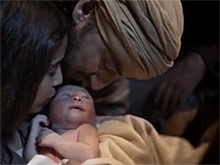Years ago, the arrival of the Penney's Christmas catalogue and the Sear's Christmas Book sent our kids scrambling for a pen. They would then spend hours looking through them, circling the things they would be interested in for Christmas gifts, and then going back and starring the ones they wanted most.
One year our daughter even slept with the Christmas catalogue. I have no idea what her dreams were like that night, but I'm pretty sure they weren't about baby Jesus, the coming of the angels, or the coming of the magi to worship the Savior of the world.
We all have dreams. Some are the dreams we have when we sleep — yes, even those of us who can rarely remember them still have them. Others are dreams we have for our lives and those we love — more than goals, dreams are those great hopes we have for the future. Some of us are not real keen on sharing those dreams — we don't want to be embarrassed if they don't come true or we don't want to be held accountable to pursuing them. Others talk about their dreams — both kinds of dreams — all the time. Regardless of whether we share them or not, we all have them.
So what is the dream you have for your life?
Is this the same dream you had for your life ten years ago?
Have you given up those earlier dreams?
What happens when your personal dreams are shattered by circumstance, betrayal, disappointment, or what feels like unanswered prayers?
And maybe the most obvious question of all: What in the world does any of this have to do with Christmas or the birth of our Lord?
Believe it or not, the story of Jesus' birth is a ship that sails on the sea of broken dreams!
- God's people had dreams of freedom, independence, influence, and importance that were all broken by the domination of Roman power and government.
- Mary had rearranged dreams of motherhood, marriage, and family when the angel of the Lord appeared and told her about the miraculous conception of Jesus.
- Joseph had shattered dreams of a holy marriage to a pure and devoted young woman of God.
- King Herod had megalomaniacal dreams of power and prestige that were threatened by the coming of Jesus and the recognition by the magi that Jesus was the true King of the Jews.
With all the broken dreams surrounding the birth of Jesus, we shouldn't be surprised by one of Matthew's key phrases in the birth stories about Jesus: "... in a dream."
Joseph is told "in a dream" that Mary was not unfaithful to him, but that the child Jesus was conceived miraculously by the power of the Holy Spirit and he should make Mary his wife (Matthew 1:20).
The magi, or wise men as we often call them, are warned "in a dream" not to go back to Herod and tell this demented king where to find Jesus (Matthew 2:12).
Joseph is warned by God "in a dream" to go to Egypt because Herod wanted to kill baby Jesus (Matthew 2:13).
Joseph is told "in a dream" that he could take his little family back home from Egypt because Herod and those who wanted to kill Jesus were dead (Matthew 2:19-20).
Joseph is told "in a dream" to not go to Judea, but back to Galilee, so that Jesus could be protected and God's promises about the Messiah being from Nazareth would be fulfilled (Matthew 2:22).
So as we remember the birth of our Lord, today and for the days and weeks and months and years to come, let's also remember that out of our broken dreams come God's deliverance and our Savior. The Father's words for us are much like they were for Joseph: "Don't be afraid!" And our response needs to be like Joseph and the magi: we need to do what God says and embrace his dreams for our future. When we do, we will find Immanuel, God with us, is more than a story; he is part of our lives. (Matthew 1:23).










Reader Comments
Archived Facebook Comments